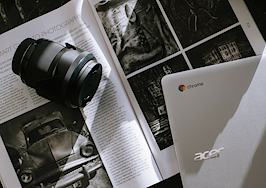A dramatic legal battle over the use of property listing photos online is nearing its conclusion and the verdict may impact the real estate agents and brokers that often schedule such photo shoots.
Real estate giant Zillow Group and real estate photography firm VHT squared off in a Seattle courtroom Tuesday, each appealing a lower court verdict from last year that was decided in VHT’s favor, and would force Zillow to fork over millions of dollars for copyright infringement.
Zillow Group and VHT petitioned the 9th U.S. Circuit Court of Appeals to overturn a district court’s final judgment on a two-year copyright battle between the two companies. VHT alleged that Zillow Group had been stealing tens of thousands of VHT’s photos and illegally using them for its own profit and gain, in part to populate Zillow Digs, a home improvement section of Zillow’s website.
The final judgment, issued July 10, 2017 by Judge James L. Robart of the U.S. District Court in the Western District of Washington in Seattle, upheld a $4.05 million verdict against Zillow Group, cut down from a previous $8.3 million verdict.
Tuesday, attorneys for Zillow and VHT appeared for oral arguments in front of a three-judge panel, which were live-streamed to the public.
VHT is appealing Robart’s decision to reduce the award granted by the jury and arguing that Zillow continues to use VHT’s photos after the sale of a listing when the agent no longer has any relationship with the property or owner of the property, according to VHT spokesperson Michelle Damico.
“VHT Studios strongly believes this issue is important for all photographers, agents and brokerages and that’s why VHT Studios continues to invest significant time and resources in the effort,” Damico said via email.
“How photographs of people’s homes are used needs to be decided by the parties involved (homeowners, agents and photographers) not third parties. Our position all along has been that simply because a photograph exists on the internet doesn’t mean that companies can use them for any purpose that suits their needs, especially when it conflicts with the interests of agents, homeowners and photographers.”
Zillow declined to comment for this story, citing ongoing litigation.
The real estate industry has been following the VHT lawsuit closely, in part because the photos at issue in the case were provided to Zillow by real estate agents, brokers and multiple listing services (MLSs) — possibly under misattributed rights. The case highlights how real estate agents and brokers may want to keep track of what happens to the photos they send to Zillow and other listing sites, and the terms under which they are sent.
VHT did not name any agents, brokers or MLSs as defendants in the case, but purporting to license photos under rights they don’t have could land real estate pros in legal hot water in the future.
Rights to property photos — essential marketing tools for agents wishing to sell homes — have been the target of increased scrutiny in recent years as the photos increasingly appear on multiple websites and their value beyond selling a specific home becomes apparent.
Zillow’s side
At oral arguments, Ian Crosby of the law firm Susman Godfrey representing Zillow Group contended real estate photographs are subject to copyright, but that they are not like music files or MP3s which are easily identifiable from each other.
“They [real estate photographs] are like a needle in a pile of needles. The ones that are subject to a third party claim of copyright that is antagonistic to the rights that Zillow providers grant — or are asserted to be antagonistic — look just like all the rest,” Crosby said.
“There’s been no claim, there’s been no evidence in this case, that any other photo studio has asserted its license to its customers is inconsistent with the rights that those customers purport to grant to Zillow when they load those photographs onto Zillow’s system.”
When Judge William A. Fletcher asked, “So what?” Crosby said, “It makes an enormous amount of difference” in regards to allegations of direct and indirect infringement (the latter refers to allegations that Zillow induced its users to infringe on VHT’s copyright).
In regards to direct infringement, Crosby argued that Zillow took no action that was specific to VHT’s copyrighted works that resulted in an infringement.
“In the case of the Digs images, Zillow’s website automatically received and processed in exactly the same way every image that every Realtor or multiple listing service sent to it,” Crosby said.
“Those Realtors [and] multiple listing services, they chose what photographers they were going to hire, they chose what images to load into their listings, and they also chose what rights to grant to Zillow to those images or at least to tell Zillow that they had.”
Although Zillow allowed users to save copies of listing photos, Zillow did not select which photos users saved, he added. That would mean that if infringement occurred, it was on the part of Zillow’s users, not Zillow itself.
Crosby also argued that Zillow did not — as Robart decided — willfully infringe on 2,700 of VHT’s photos, which would have required Zillow to have taken affirmative actions to avoid learning about infringement of VHT’s photos — a concept called “willful blindness.”
Fletcher interrupted Crosby and pointed out that Zillow had testified that when a photo comes in from two different sources with one source giving Zillow longer use of a photo, that Zillow’s “trumping” rules choose the photo that allows the longer use without investigating why the permissions are different. “That sounds as though you’re on notice that there’s a problem and you chose the one that’s more advantageous to you without further inquiry. How is that not willful blindness?” Fletcher said.
Crosby noted that the rights that determine trumping order are those between Zillow and the provider of the photo and not between Zillow, the provider and VHT.
Zillow’s rules generally give priority to whomever is “closest” to the listing — often the agent, according to Crosby. So if Zillow gets the same photo from a Realtor and an MLS and the Realtor tells Zillow that it can keep the photo up and the MLS says it can’t and Zillow keeps the photo up, there’s nothing about that sequence of events that intrinsically indicates an intent to infringe, he said.
“Indifference is not enough. Willful blindness requires an affirmative act to not learn,” Crosby said.
VHT’s side
Representing VHT, Steve Rummage of law firm Davis Wright Tremaine, told the judges that Zillow is not a “passive host” in regards to the infringement of VHT’s images.
Rather, Zillow allowed its users to save listing photos to its Digs site and told users to “keep saving.” When users did this, Zillow made 16 different copies of each image, deciding whether to make them searchable or not, crop them or not, and publicly display them or not, according to Rummage.
This is not like a “passive copy shop case” where someone walks into a copy shop with infringing content, copies it and leaves, he said.
Rather, Zillow invited users to save images to their “boards” on Zillow’s website and “then they took 15 extra copies for themselves which they trimmed and shaped and used for their own purposes,” Rummage said.
Boards not marked “private” are automatically public and boards often belong to real estate professionals, he noted. “There was an intent [on Zillow’s part] to drive traffic to those,” he said.
In regards to willfulness, VHT’s license only authorizes the use of an image while a property is for sale and when a property is sold, Zillow decides what image to display, according to Rummage.
In legal filings, Zillow calls feed agreements that require Zillow to take down listing data, including photographs, when a listing sells or otherwise goes off-market “deciduous.” Feeds that are “evergreen” are those under which Zillow says it has the right to continuing using and displaying data and photographs after a property sells or a listing goes off-market.
Rummage noted that if the rights to an image are deciduous, Zillow looks for evergreen rights for the same property when it is sold. Beginning in 2014, Zillow was on notice that by keeping VHT’s images “evergreen,” Zillow was infringing on VHT’s rights, but nonetheless, “audits show that Zillow continued to leave up deciduous images,” he said.
“The jury knew that Zillow had gotten repeated notices from VHT on infringement,” he added.
Zillow’s rebuttal
Given a chance to rebut Rummage’s statements, Crosby said that Rummage had not provided “identification of a single act that Zillow took that was specific to any VHT photo that is at issue.” The “Save” button mentioned was applied to every image on Zillow’s site, not just VHT’s images, Crosby said.
“The rules by which Zillow kept listings up or not depended on what the providers had specified for those images, but they were applied uniformly to all of the images that any provider provided,” Crosby said.
After oral arguments, Brian Balduf, VHT’s CEO and co-founder, told Inman he was “thrilled” with the hearing.
“I think Steve Rummage did a fantastic job of conveying the key points of our appeal, especially in the short amount of time that is allotted for oral arguments. There are a lot of pieces to this case but it’s very important for agents, brokerages, MLSs and of course photographers. So we are glad to see our voices being heard,” he said via email.
“We look forward to seeing this through. We believe copyright and licensing are important issues for the real estate industry and that’s why we have taken the lead during the past three years.”
After oral arguments, most cases are decided within three months to a year, though the court has no time limit, according to the Ninth Circuit’s website.










